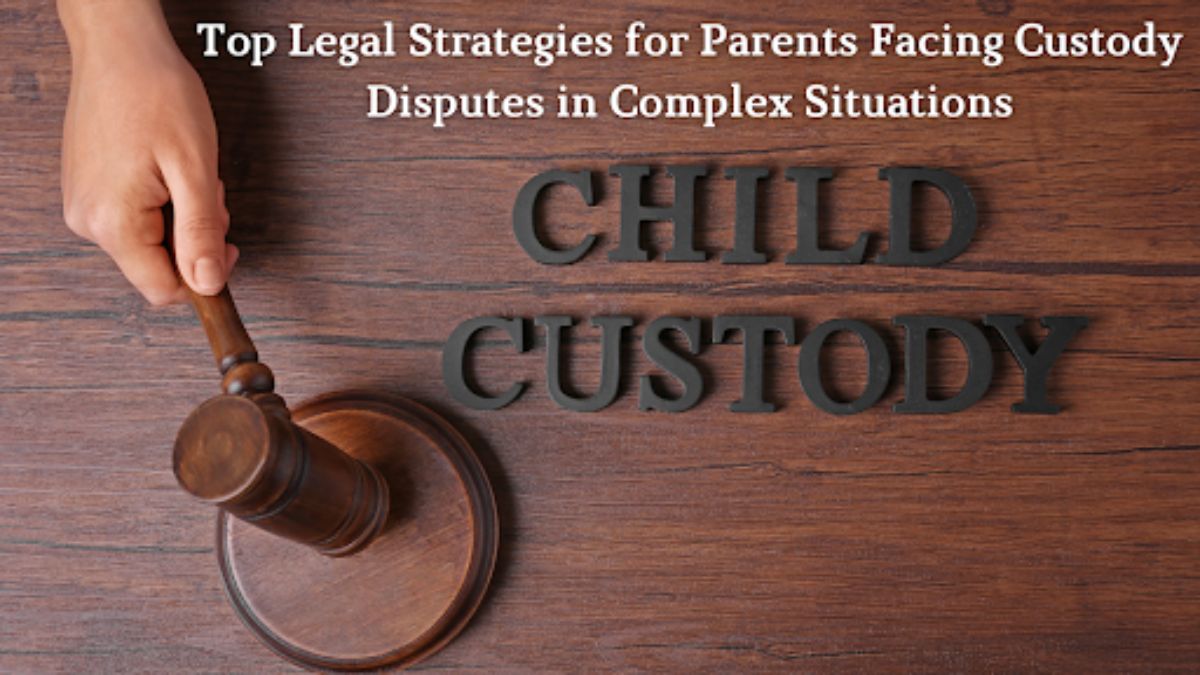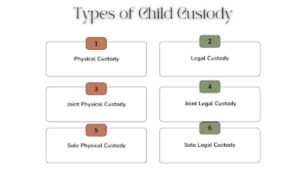LAW
Top Legal Strategies for Parents Facing Custody Disputes in Complex Situations

Facing a custody dispute can be one of the most emotionally draining and stressful experiences for a parent. The fear of losing time with your child and the uncertainty of the legal process can be overwhelming.
In these moments, having the right legal strategy becomes essential to protect your parental rights and maintain a strong relationship with your child. This blog outlines the most effective strategies recommended by top child custody attorneys, helping you navigate complex situations with confidence and clarity.
Document Everything in Detail
The Power of Thorough Documentation
Experienced custody attorneys stress that detailed documentation is crucial to winning a custody case. Courts depend on solid evidence, not just verbal claims. Key records to keep include:
- Communication logs with the other parent
- Financial contributions and expenses
- Medical and school records
- Visitation schedules and any deviations
- Incidents of concern
- Photos and videos of positive interactions with your child
Leveraging Technology for Documentation
Modern custody attorneys suggest using co-parenting apps that help you:
- Track communications
- Document expenses
- Record pickup and drop-off times
- Store important documents
- Generate reports for court submissions
These tools can make the documentation process easier and more organized, providing you with critical evidence when needed.
Leveraging Expert Testimony
In custody disputes, child custody attorneys often rely on various expert witnesses to provide objective insights and strengthen their cases. These experts may include child psychologists, custody evaluators, educational specialists, mental health professionals, and substance abuse counselors.
Each expert offers specialized knowledge that can help assess the child’s needs and parental capabilities. To make the most of expert testimony, your custody attorney will help you select qualified professionals, guide you through the evaluation process, and ensure that any unfavorable evaluations are effectively challenged. Presenting expert findings in a clear, compelling manner can significantly impact the outcome of your case.
Understanding Legal Standards for Custody
The “Best Interests” Standard
Every child custody attorney emphasizes that courts primarily focus on the “best interests of the child.” Key factors courts consider include:
- Each parent’s ability to provide stability
- The child’s relationship with each parent
- Each parent’s physical and mental health
- The child’s ties to school and community
- Any history of domestic violence or substance abuse
Common Custody Arrangements
Your custody attorney may recommend different arrangements based on your situation:
| Arrangement Type | Description | Best For |
| Joint Physical Custody | Equal or near-equal time with both parents | Cooperative parents living near each other |
| Primary Physical Custody | The child lives mainly with one parent | Situations where distance or circumstances prevent equal time |
| Sole Custody | One parent has full custody | Cases involving abuse, neglect, or parental unfitness |
| Bird’s Nest Custody | Children stay in one home, and parents rotate | Highly cooperative parents prioritize stability |
Navigating High-Conflict Co-Parenting
Managing conflict in a custody dispute while protecting your legal rights can be challenging, but experienced custody attorneys recommend several strategies to help. Implementing parallel parenting techniques, where communication is minimized and highly structured, can reduce conflict.
Always communicate through approved channels, such as co-parenting apps, and strictly follow all court orders to protect your position in the case. It’s also crucial to document every incident of conflict to use as evidence if needed.
If you suspect parental alienation, work closely with your attorney to document these behaviors and seek professional intervention early. You may also consider requesting a custody evaluation to ensure your child’s best interests are being met while continuing to maintain positive, healthy interactions with your child.
Preparing for Mediation
Effective mediation can help resolve custody disputes without the stress and expense of litigation. Your child custody attorney will guide you in preparing your position and identifying your priorities, ensuring you’re ready to negotiate effectively. Understanding your BATNA (Best Alternative to Negotiated Agreement) is crucial, as it helps you assess when to compromise and when to stand firm.
Developing realistic proposals and navigating the emotional challenges of mediation are key steps your attorney will support you through. Mediation is often a better choice when both parties are open to compromise, communication is still possible, costs are a concern, and privacy is important. However, if cooperation is unlikely, litigation may be the better option for protecting your interests.
Emergency Custody Orders
When to Seek Emergency Orders
Custody attorneys advise seeking emergency orders in situations where:
- Physical abuse is suspected
- Substance abuse poses a risk to the child
- A parent threatens to flee with the child
- Any immediate danger exists
Building a Strong Emergency Case
To build a strong emergency case, your custody attorney will:
- Gather evidence quickly
- File the appropriate legal paperwork
- Present compelling testimony in court
- Follow up with permanent custody orders to ensure long-term protection
These steps are critical in safeguarding your child’s well-being during urgent situations.
Planning for Future Modifications
Custody arrangements are not always set in stone and can be modified when significant life changes occur. Common reasons for modification include a parent relocating, changes in work schedules, remarriage, health issues, or the evolving needs of the child. To build a strong case for modification, it’s essential to work closely with your custody attorney.
Start by thoroughly documenting the changes in circumstances, gather relevant supporting evidence, and strategically time your filing to align with the best interest of the child. Presenting a clear case that highlights how the modification will benefit the child can greatly increase your chances of success.
Types of Custody

Wrapping Up
Child custody disputes are mentally and legally challenging; however, with the right approaches, you will be in a position to protect your rights and those of your child. You must work closely with an experienced custody attorney who can help in building a solid case, whether for modification, conflict, or mediation.
You can face your custody process with confidence, knowing that expert testimony and voluminous documentation, combined with a clear understanding of your options, will serve your child’s best interest.
Frequently Asked Questions
What is the biggest mistake in custody battles?
The biggest mistake is failing to document everything. Courts rely heavily on evidence, and without thorough records, it becomes harder to prove claims and protect your rights.
Who wins most child custody cases?
Mothers still win most custody cases, though courts prioritize the child’s best interests, assessing factors like parental stability, involvement, and emotional bonds rather than gender alone.
How to win a custody battle as a mother?
To win a custody battle, focus on proving stability, involvement in the child’s life, and the ability to provide a nurturing environment. Thorough documentation and legal support are critical.
How can a father increase his chances of winning custody?
Fathers can improve their chances by demonstrating consistent involvement in the child’s life, maintaining a stable environment, documenting interactions, and showing a commitment to the child’s well-being and needs.
LAW
Patel Bakersfield City Council Threats: Legal Community Impact

Introduction
In April 2024, Riddhi Patel, a 28-year-old Bakersfield resident, made headlines after allegedly threatening members of the Bakersfield City Council during a public meeting. This incident has sparked widespread discussions about public discourse, legal accountability, and community safety. This article delves into the details of the event, the subsequent legal proceedings, and the broader implications for the Bakersfield community.
The Incident
On April 10, 2024, during a Bakersfield City Council meeting, Riddhi Patel was escorted out after making verbal threats against council members. These threats were reportedly related to a resolution concerning a Gaza ceasefire. Patel’s actions drew immediate attention and raised concerns about the safety of public officials and the conduct of public meetings.
Legal Proceedings
Following the incident, Patel faced multiple felony charges. She was accused of making death threats toward the Bakersfield City Council, leading to her appearance in court for hearings. The legal proceedings have been closely followed, highlighting the serious consequences of threatening public officials.
Community Impact
The threats against the Bakersfield City Council have had a profound impact on the local community. Residents have expressed concerns about the safety of public officials and the potential chilling effect on public discourse. The incident has sparked discussions about the balance between free speech and the need to protect individuals from threats and harassment.
Comparative Analysis: Legal Consequences for Threatening Public Officials
To provide a broader perspective, here is a comparison of legal consequences for individuals who threaten public officials in various jurisdictions:
| Jurisdiction | Legal Consequences | Notable Cases |
|---|---|---|
| United States | Federal and state laws impose severe penalties, including imprisonment and fines. | Riddhi Patel’s case in Bakersfield, California. |
| United Kingdom | Offenses under the Malicious Communications Act can lead to imprisonment. | Case of a man jailed for sending threatening letters to MPs. |
| Canada | Criminal Code provisions allow for prosecution with potential imprisonment. | Individual convicted for threatening a Member of Parliament. |
| Australia | Laws against threatening communications can result in significant penalties. | Person sentenced for sending threatening emails to a senator. |
| Germany | Threatening public officials is a criminal offense with potential jail time. | Case of a man convicted for threatening a local mayor. |
Conclusion
The case of Patel Bakersfield City Council Threats against the Bakersfield City Council underscores the critical importance of maintaining respectful and lawful communication within democratic societies. It highlights the need for legal frameworks that protect public officials from threats while safeguarding the fundamental right to free speech. As the legal proceedings continue, the community remains vigilant, reflecting on the balance between individual rights and public safety.
LAW
Nashville Law Firm Demands Transparency in Chris Young Arrest, Advocates for Fair Treatment of All Citizens

Nashville, TN — Recently, country showbiz star Chris Young was arrested which caused a stir in the society and due to that, Nashville TN Law has issued an appeal for more fairness and transparency in celebrity arrest cases. In the wake of the release of the security footage that cast doubt on the behavior of the law enforcement officers during the arrest then the firminstead is stressing on the best practices and independence of person rights during such arrest.
Security Footage Raises Concerns
The event that took place at the convenience store and recorded on a security camera raised public awareness of how police officers responded to the case. The leaked video has brought a lot of concern and debate on how Chris Young was arrested, where he seemed to have been apprehended in a rather aggressive way that may have been unlawful to the rights of the artist.
While the transparency rises, Nashville TN Law should seek to understand if the police use different treatment methods after big-name arrests such as Chris Young.Truck accident lawyer Nashville According to David Raybin from Nashville TN Law, ‘’Such tapes can give important information concerning the events that led to the arrest’. This footage is helpful in making sure that the police force is always on the line for their conduct.” Primally, all people who are offenders should be treated equally regardless of their public visibility and they should enjoy equal rights under the constitution and the law.
Commitment to Legal Advocacy
Nashville TN Law has been practising personal legal services in both criminal defense and civil litigations, such as car accidents, and wrongful arrest. Some of the skills that Center for is selected from are the firm’s experience in personal injury law which has enabled its clientele to appreciate the necessity of shield when dealing with either police or other entities.
Aside from personal injury, Nashville TN Law practices law involving medical malpractice, wrongful death and civil rights violations. With experience on their side, the firm can help victims pursue justice after suffering a civil rights violation — whether in connection with an arrest, during incarceration or any other situation that involves excessive force/focus.
Said “Everybody, famous or not, deserves a fair trial.” “We must allow our legal system the opportunity to right a wrong if security footage can show someone’s rights were violated. This case shows the important need of law enforcement and agencies to be transparent, to act within the scope of the law and for communities.
Advocating for Systemic Change
The firm’s advocacy extends beyond individual cases; car accident lawyer nashville is dedicated to pushing for systemic change in how arrests and interactions with law enforcement are handled, particularly in Tennessee. In the wake of incidents like the Chris Young arrest, Nashville TN Law calls for clearer guidelines and increased oversight to ensure that high-profile individuals and everyday citizens alike receive fair treatment.
“Police departments must continually assess their procedures and practices to ensure they are not only effective but also just,” David Raybin continued. “We are committed to supporting reforms that make our legal system fairer for everyone, regardless of their status or background.”
About Nashville TN Law
Nashville TN Law is a highly rated legal firm based in Nashville Tennessee with a focus on accident injury, cases involving death, civil rights abuses and defense law. Our team of Nashville TN Law attorneys has years of experience and is guaranteed to ensure the rights of the citizens who have been harm by others, including policemen, are observed. In its services, the firm provides all form of legal services with an aim of making sure that the clients get the justice they require.
LAW
Beyond Billboards: Dominate Digital with These 5 Advertising Strategies for Lawyers

I. Introduction: The Changing Landscape of Legal Services
Imagine this: someone spills hot coffee at their favorite café, suffering severe burns. What’s their first instinct? Do they flip through the Yellow Pages for a personal injury lawyer? Not likely. Instead, they grab their phone and type “burn injury lawyer [their city]” into a search engine. This is the reality of today’s legal landscape. Clients are no longer passively waiting to be found; they’re actively searching online for solutions to their legal problems.
The days of relying solely on billboards, newspaper ads, and phone book listings are fading fast. While these traditional methods might still hold some value, they simply can’t compete with the reach and precision of digital marketing. Today, potential clients are online, researching legal issues, comparing attorneys, and reading reviews. To connect with these tech-savvy individuals, lawyers need to establish a strong online presence and leverage the power of digital advertising. This means understanding how to navigate search engine optimization, social media, and online advertising platforms to effectively reach and engage potential clients.
II. Why Digital Marketing Matters for Lawyers
Think of digital marketing as a high-tech, highly efficient version of word-of-mouth referrals. Instead of relying on chance encounters or limited networks, you can precisely target potential clients who need your services right now. A family law attorney can use online advertising to reach individuals in their city who are going through a divorce, have recently changed their relationship status on social media, or are searching for information about child custody. This level of granularity is simply impossible with traditional advertising.
But digital marketing isn’t just about casting a wide net; it’s about analyzing and optimizing every step of the way. You can track website visits, see which ads are generating the most clicks, and even measure how many of those clicks turn into actual clients. This data-driven approach allows you to refine your strategies, ensuring you’re getting the most out of your marketing budget. And speaking of budgets, digital marketing often proves to be more cost-effective than traditional methods. You can set your own spending limits, track your return on investment, and adjust your campaigns as needed.
III. Search Engine Optimization (SEO): Get Found When It Matters Most
In the vast expanse of the internet, your website is a needle in a haystack. Search Engine Optimization (SEO) is the art and science of making that needle magnetic. Essentially, it’s about optimizing your website and online presence to rank higher in search engine results. Think of it this way: when someone searches for “divorce lawyer in Chicago,” you want your firm’s website to be one of the first they see.
This is where keywords come into play. By strategically incorporating relevant keywords throughout your website content – terms like “child custody,” “alimony,” or “property division” – you signal to search engines what your site is all about. But SEO is more than just sprinkling keywords; it’s about creating a user-friendly website with well-structured content that answers potential clients’ questions.
Think of your website as a well-organized library. Clear headings, concise paragraphs, and relevant images make it easy for both visitors and search engines to navigate and understand your content. Beyond your website, building high-quality backlinks (links from other reputable websites to yours) and getting listed in relevant online directories can significantly boost your search engine rankings.
IV. Pay-Per-Click (PPC) Advertising: Reach the Right Clients Now
If SEO is the marathon of digital marketing, then Pay-Per-Click (PPC) advertising for lawyers is the sprint. Platforms like Google Ads allow you to place targeted ads directly in front of potential clients at the exact moment they’re searching for legal help. Imagine someone searches “car accident lawyer near me” – with PPC, your ad can appear at the top of the search results page, connecting you with that potential client instantly.
Here’s how it works: you select relevant keywords related to your legal services, such as “personal injury,” “wrongful death,” or “slip and fall.” You then set a budget and bid on these keywords, essentially competing with other lawyers for ad placement. When someone searches using those keywords, your ad may appear, and you only pay when someone clicks on it. This makes PPC incredibly efficient, as you’re only paying for actual engagement with your ad.
The beauty of PPC lies in its precision. You can tailor your ads to specific demographics, locations, and even the time of day. This ensures that your message reaches the right people at the right time, increasing the likelihood of converting clicks into consultations.
However, simply appearing in search results isn’t enough. Your ad copy needs to be compelling and informative. A strong headline, clear description of your services, and a powerful call to action (like “Free Consultation” or “Call Now”) are crucial for attracting clicks and generating leads. Think of your ad as a digital handshake – it’s the first impression you make on a potential client, and it needs to be concise, engaging, and persuasive.
V. Social Media Marketing: Connect and Engage
Social media isn’t just for sharing vacation photos and cat videos; it’s a powerful tool for lawyers to connect with potential clients and build a thriving online community. Think of platforms like LinkedIn, Facebook, and even TikTok as virtual networking events, where you can engage with your audience, share your expertise, and build relationships.
LinkedIn, with its focus on professional networking, is ideal for establishing yourself as a thought leader in your legal field. Share insightful articles, participate in industry discussions, and connect with other professionals in your area. By consistently providing valuable content and engaging with your network, you can build a reputation for expertise and attract potential clients who are seeking top-tier legal counsel.
Facebook, on the other hand, offers a more relaxed environment for building a community around your practice. Create a dedicated page for your firm, share informative content (like blog posts and FAQs), and engage with followers by responding to comments and messages. Facebook also allows you to run highly targeted ads, reaching specific demographics and interests within your local community.
While it might seem unconventional, even TikTok can be a viable platform for legal marketing, particularly if your target audience includes younger demographics. Creative, informative, and even humorous short videos can help you connect with potential clients in a fresh and engaging way.
VI. Content Marketing & Email Marketing: Build Relationships and Nurture Leads
In the legal field, trust is paramount. Clients want to know they’re working with knowledgeable, reliable professionals who have their best interests at heart. Content marketing is a powerful way to build that trust by showcasing your expertise and providing valuable information to potential clients.
Think of your website as a hub for legal knowledge. Regularly publish informative blog posts, articles, videos, and infographics that address common questions and concerns. A personal injury lawyer, for example, could create content explaining what to do after a car accident, how to navigate insurance claims, or the types of damages that can be recovered. By providing this valuable information, you position yourself as a trusted resource and attract potential clients who are actively seeking solutions to their legal problems.
But creating great content is only half the battle; you need to get it in front of the right people. This is where email marketing comes in. Encourage website visitors to sign up for your email list by offering free resources, such as ebooks, checklists, or case study summaries. Once you have a list of subscribers, nurture those leads by providing valuable content through regular newsletters and updates. Share recent blog posts, legal news relevant to their interests, and even exclusive offers or invitations to webinars.
VII. Conclusion: Embrace the Digital Age of Legal Marketing
In today’s competitive legal landscape, a strong online presence isn’t just an advantage—it’s a necessity. Potential clients are searching for legal help online, and if your firm isn’t visible, you’re missing out on valuable opportunities. Digital marketing empowers you to connect with those clients, build relationships, and establish your firm as a trusted authority.
By embracing the strategies we’ve explored – optimizing your website for search engines, utilizing targeted advertising, engaging on social media, and providing valuable content – you can reach the right clients at the right time. Remember, digital marketing is an ongoing process, not a one-time fix. It requires consistent effort, analysis, and refinement to achieve optimal results.

 Cartoon1 year ago
Cartoon1 year agoUnlocking the Potential of Nekopoi.care: A Comprehensive Guide

 Game1 year ago
Game1 year agoExploring Aopickleballthietke.com: Your Ultimate Pickleball Destination

 BUSINESS1 year ago
BUSINESS1 year agoWhat Companies Are In The Consumer Services Field

 BUSINESS11 months ago
BUSINESS11 months agoUnraveling the Mystery of 405 Howard Street San Francisco charge on Credit Card

 HOME IMPROVEMENT1 year ago
HOME IMPROVEMENT1 year agoVtrahe vs. Other Platforms: Which One Reigns Supreme?

 TECHNOLOGY11 months ago
TECHNOLOGY11 months agoThe Guide to Using Anon Vault for Secure Data Storage

 ENTERTAINMENT8 months ago
ENTERTAINMENT8 months agoUnderstanding Bunkr Album: A Comprehensive Guide

 ENTERTAINMENT1 year ago
ENTERTAINMENT1 year agoThe Epic Return: Revenge of the Iron-Blooded Sword Hound
















